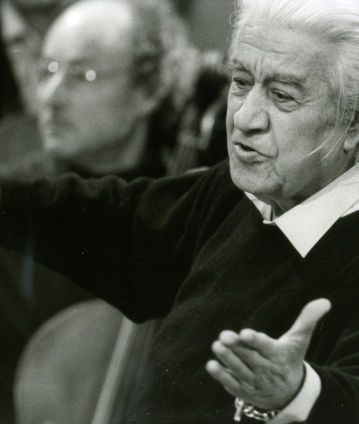Sergiu Celibidache: The triumphant return

From 1945 to 1952 Sergiu Celibidache successfully accompanied the Berliner Philharmoniker through a particularly turbulent period in post-war German history. But Berlin audiences then had to wait almost forty years before this magician of the baton returned to conduct the Berliner Philharmoniker again on 31 March 1992. The present documentary accompanies conductor and orchestra on their journey towards this memorable concert, which featured a performance of Bruckner’s Seventh Symphony. A fascinating record indeed!
Today’s generation of young conductors can only dream of being appointed principal conductor of the Berliner Philharmoniker straight out of college. In 1946 the orchestra’s existing principal conductor, Wilhelm Furtwängler, was still undergoing a process of denazification, with the result that Celibidache was offered the chance of a lifetime. He presumably did not hesitate for a moment before seizing it with both hands.
There followed six great years during which the young Romanian conductor and the venerable orchestra learnt a lot about each other while working together in this way. Together they discovered the whole of the repertory that had been banned during the years of National Socialism in Germany, and every week there was something new on the programme. The results of their work together were also presented to audiences outside Berlin in the course of a number of highly successful tours, including one that took them to London in November 1948 and another to Edinburgh in August 1949. With the passage of time, however, the magic wore off. Celibidache grew impatient with the older musicians in the orchestra, and rehearsals were more and more dominated by unpleasant scenes and noisy confrontations. The breach was sealed in 1954, when the orchestra decided to elect not Celibidache but Herbert von Karajan as Furtwängler’s successor following the latter’s untimely death.
The Berliners had to wait thirty-eight years before Celibidache returned to conduct them again in 1992. By then he was a star conductor in demand all over the world and in 1979 he had found a new musical home for himself with the Munich Philharmonic. Not until the German president, Richard von Weizsäcker, intervened and invited Celibidache to conduct two benefit concerts in support of Romanian orphanages could the temperamental maestro be persuaded to return to the podium of the Berliner Philharmoniker. He conducted the first of two acclaimed performances of Anton Bruckner’s Seventh Symphony on 31 March 1992, and the present documentary shows conductor and orchestra rehearsing for this memorable occasion, while also including interviews with many orchestral musicians. The result is a fascinating record of the conductor’s triumphant return.
A film by Wolfgang Becker (1992)
Categories
Artists
© 1992 Sony Classical